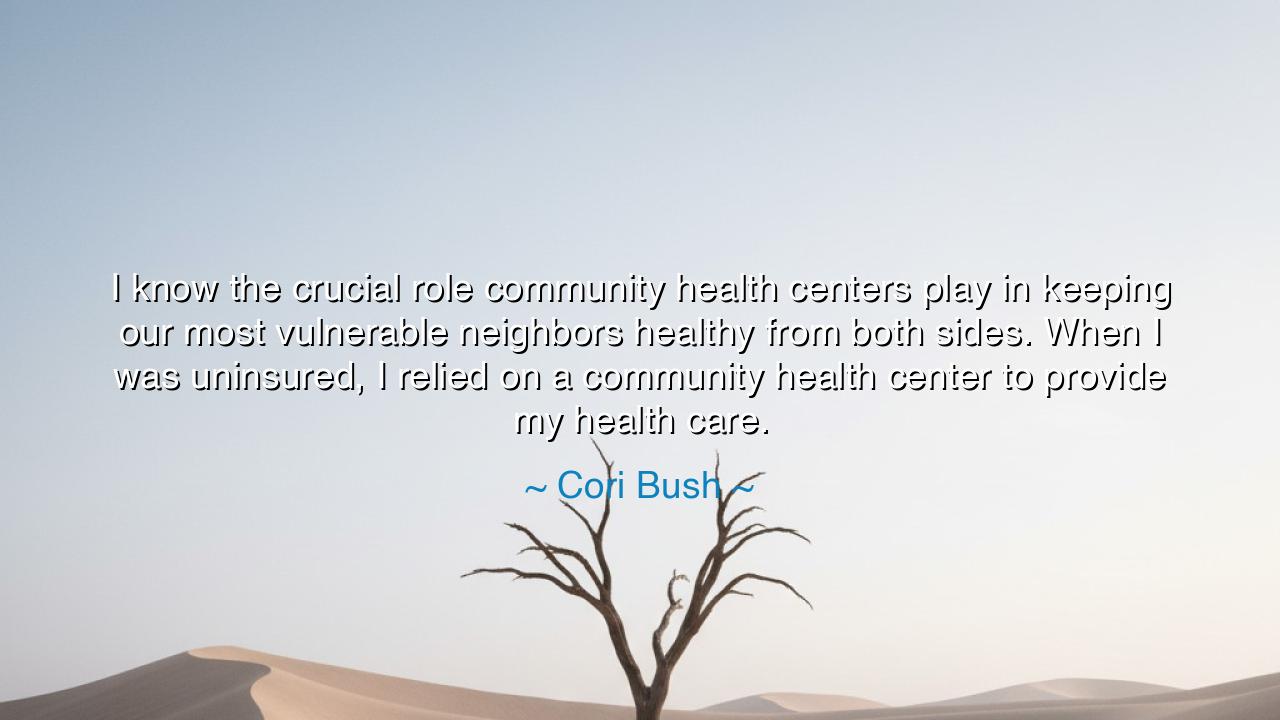
I know the crucial role community health centers play in keeping
I know the crucial role community health centers play in keeping our most vulnerable neighbors healthy from both sides. When I was uninsured, I relied on a community health center to provide my health care.






The courageous leader and servant of the people, Cori Bush, once spoke from the depths of lived experience: “I know the crucial role community health centers play in keeping our most vulnerable neighbors healthy from both sides. When I was uninsured, I relied on a community health center to provide my health care.” These are not the words of a distant lawmaker or detached observer—they are the testimony of one who has walked the path of struggle, who has known both need and service, and who now stands as a bridge between the suffering and the system that should serve them. In her statement lies a truth both ancient and enduring: that compassion, when made tangible through community, becomes the most powerful medicine of all.
In the days of old, the healers of the people were not confined to grand palaces or halls of wealth. They were found in the humble places—among the poor, the sick, and the forgotten. The ancient physicians of Egypt, the herbalists of China, the midwives of Greece—all understood that healing was a sacred duty, not a privilege. They treated not only the body but the soul, tending to the broken spirit as much as the broken bone. The community health center, as Bush describes it, carries this same sacred lineage into the modern world. It is the temple of healing for those who have been denied entry elsewhere—the uninsured, the marginalized, the vulnerable. In these small sanctuaries, the ancient vow of service to all humanity still breathes.
When Bush says she relied on a community health center when she was uninsured, she speaks to a shared truth that transcends class and time: that illness humbles all, and that care, when freely given, restores more than health—it restores dignity. Her story is not of weakness but of endurance. To seek help when the world offers none is an act of quiet heroism. And to remember that struggle once one has risen from it—to speak of it with humility and use it to uplift others—is the mark of a true leader. The ancients would have called such a person a “servant of the polis”—one who rules not to be above, but to be among, to lift their people from suffering.
There is a parallel in the story of Florence Nightingale, the “Lady with the Lamp,” who tended to soldiers in the blood and filth of war. She did not wait for permission to act; she saw suffering and went forth. Like Cori Bush, she understood that healing begins not in the halls of government, but in the heart of compassion. Nightingale transformed the world’s understanding of medicine not by invention, but by humanity—by insisting that the poor and wounded deserved the same care as the rich and mighty. In her quiet light, we see the same fire that burns in Bush’s words: the belief that to care for the vulnerable is to honor the divine in every human being.
Bush’s quote also reveals a profound duality of understanding—she has seen “both sides” of the struggle. As one who has received care and one who now fights to provide it, she embodies the bridge between empathy and action. The ancients taught that wisdom comes not from study alone but from experience—from having endured the hardship one seeks to heal in others. The leader who has felt hunger will fight hardest to feed the hungry; the healer who has known pain will treat pain with gentleness. Bush’s journey from patient to advocate is a living embodiment of this ancient truth: that true service must come from shared humanity, not distant charity.
From her words arises a lesson that every generation must learn anew—that health is a right, not a luxury. The strength of a nation, like the strength of a body, is measured by how it cares for its weakest parts. When one limb suffers, the whole being aches. When one neighbor falls ill without help, the community itself grows sick with indifference. To build community health centers, to fund them, to protect them, is not mere policy—it is moral duty. As Bush reminds us, they are not only clinics; they are lifelines, places where the neglected are seen, where the forgotten are remembered, and where the hopeless find restoration.
So let this truth be carried forward as wisdom for all who hear: compassion must never be conditional, and care must never be a privilege of the few. If you are one who can give, then give—your time, your voice, your resources—to strengthen the hands that heal. Support the community health centers, the shelters, the places of service where humanity finds refuge. If you are one who suffers, remember that to seek help is not weakness—it is courage, and through your endurance, you lend strength to the world.
Thus, Cori Bush’s words become more than remembrance; they are a call to action and awakening. They remind us that justice begins not in legislation, but in compassion made visible. The healers of the past tended to the body; the healers of today must tend to society itself. Let us, then, be healers in our own way—building communities where no one must flee illness alone, and where care is not bought, but shared. For as long as we nurture the health of our neighbors, we nurture the health of our humanity, and in that sacred duty, we honor both the ancient and the eternal truth: that we belong to one another.






AAdministratorAdministrator
Welcome, honored guests. Please leave a comment, we will respond soon